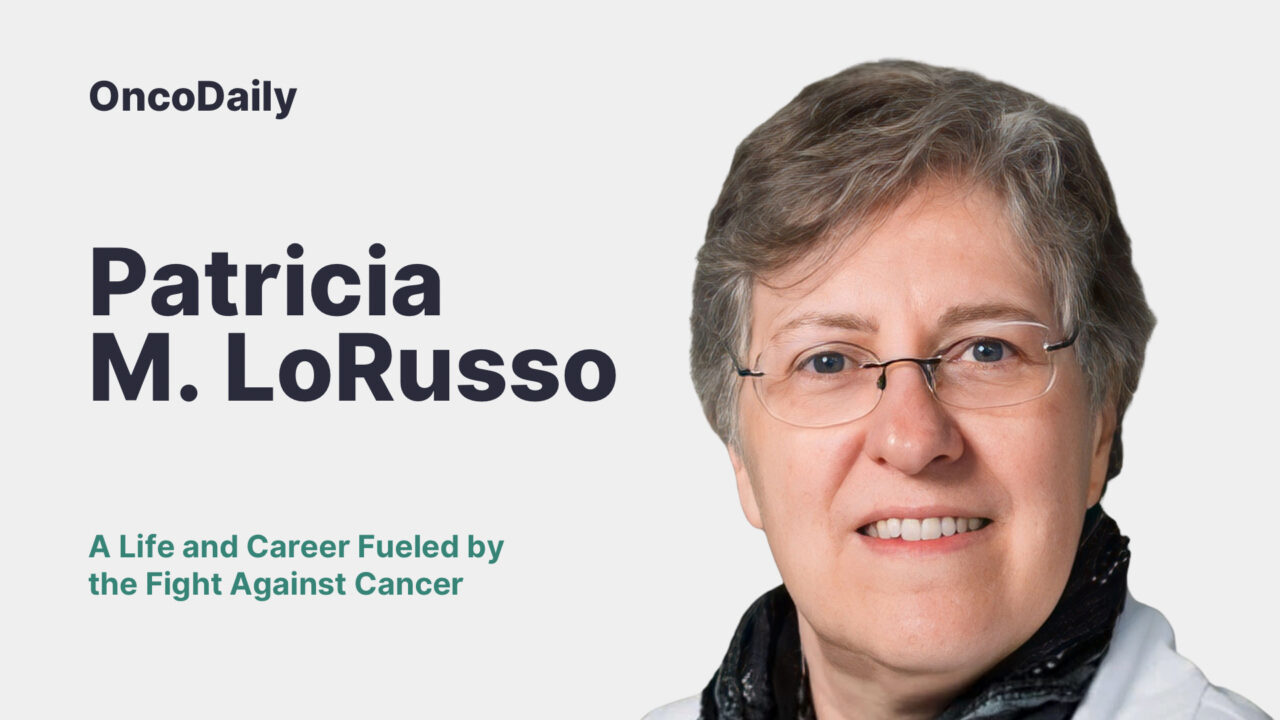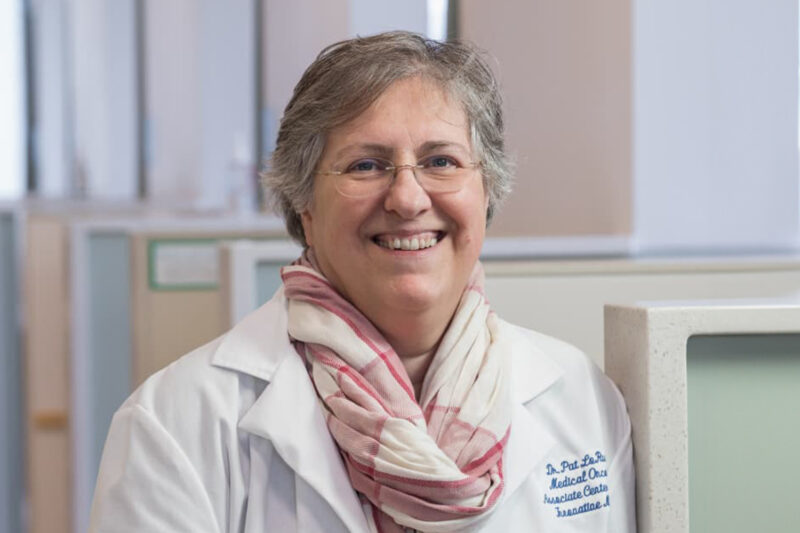
Patricia M. LoRusso: A Life and Career Fueled by the Fight Against Cancer
Patricia M. LoRusso was born and raised in Detroit, Michigan, as the youngest of four children. The loss of both her parents to cancer while she was still a teenager deeply influenced her decision to pursue a career in oncology. Motivated by personal tragedy, she developed a lifelong commitment to improving the lives of people with cancer.
She earned a Bachelor of Science degree in Biology and Religious Studies from Marygrove College in 1977. She went on to complete her medical education at Michigan State University College of Osteopathic Medicine, receiving her DO degree in 1981. In 2015, in recognition of her remarkable contributions to medicine and cancer research, Michigan State University awarded her an honorary PhD.
Dr. LoRusso completed her internship and residency in internal medicine at Riverside Osteopathic Hospital. She then pursued a hematology-oncology fellowship at Wayne State University, where she trained under the mentorship of Drs. Thomas Corbett and Richard Pazdur. Her early exposure to translational science and clinical oncology laid the groundwork for her future in drug development.
Career and Leadership Roles
Dr. LoRusso began her academic and clinical career at Wayne State University’s Barbara Ann Karmanos Cancer Institute in 1988. There, she led the institution’s Phase I Clinical Trials Program and directed the Eisenberg Center for Translational Therapeutics. Her leadership helped build one of the nation’s most productive early-phase oncology research programs.
In 2014, Dr. LoRusso was recruited to Yale School of Medicine, where she currently serves as the Amy and Joseph Perella Professor of Medicine, Chief of Experimental Therapeutics, and Associate Director for Experimental Therapeutics at Yale Cancer Center. In this role, she oversees the translation of laboratory findings into novel therapies for patients with cancer, with a particular emphasis on solid tumors.
Throughout her career, she has also been a dedicated mentor, training the next generation of oncology researchers and clinicians. Her reputation for scientific excellence and strategic vision has made her one of the most respected figures in academic oncology.
When Oncology Becomes Personal
For Dr. Patricia M. LoRusso, the fight against cancer is not only a scientific endeavor but a deeply personal mission. Her early exposure to the devastating impact of the disease came at a formative time in her life.
“I always look at cancer as my enemy. It’s been my enemy for many, many years.”
Both of her parents were diagnosed with cancer and died before she graduated from high school.
“When my parents were sick, there were no drugs to treat their cancers,” she remembers.
This profound loss, which she still recalls with visible emotion, marked the beginning of what would become a lifelong commitment to changing the outcomes for people with cancer.
“When my mother died, and then subsequently my father died, both of cancer, literally before I graduated from high school, I realized that I could use that as either a curse or a gift,” she says. “What I decided to do was use it as a gift and use their deaths from cancer as a nidus to focus my career. Therefore, since I was young, I wanted to be a medical oncologist.”
Over the years, Dr. LoRusso has often referred to cancer as her “enemy” , an adversary that has fueled her dedication to advancing therapeutics through experimental research. Her work in early-phase clinical trials has led to the development of therapies that were unavailable to her parents, and her professional mission has become inseparable from the memory of their suffering.
Beyond the lab and clinic, she continues to draw inspiration from the very individuals she treats.
“The greatest teachers that I have had along the way have been my patients,” she reflects. “They’ve been the fuel that has kept me going.”
Her perspective is informed not only by the science of oncology but by the human experience of it, by witnessing firsthand what cancer takes away, and what modern medicine might give back.
Research and Scientific Contributions
Dr. Patricia M. LoRusso is internationally regarded as one of the foremost leaders in the field of early-phase oncology drug development. Over the course of more than three decades, she has served as the principal investigator on over 100 Phase I and translational clinical trials, many of which have been first-in-human studies that introduced entirely new classes of cancer therapeutics into the clinic.
Her research has focused on the development and clinical evaluation of novel targeted agents, particularly in solid tumors. She played a critical role in the clinical development of several drugs that have gone on to receive U.S. Food and Drug Administration (FDA) approval, including poly (ADP-ribose) polymerase (PARP) inhibitors, mitogen-activated protein kinase kinase (MEK) inhibitors, and Kirsten rat sarcoma virus (KRAS) G12C inhibitors. These drugs represent breakthroughs in precision oncology and have significantly altered the treatment landscape for cancers such as ovarian, breast, and non-small cell lung cancer.
At both the Barbara Ann Karmanos Cancer Institute and later at Yale Cancer Center, Dr. LoRusso built and led highly productive experimental therapeutics programs. Under her direction, these programs were instrumental in establishing best practices for Phase I trial methodology, including optimized dose escalation strategies, adaptive trial designs, and incorporation of pharmacokinetic/pharmacodynamic endpoints.
A defining feature of Dr. LoRusso’s research philosophy is the integration of translational science into clinical trial design. She has championed the use of molecular biomarkers, next-generation sequencing, and real-time genomic profiling to guide therapeutic decisions and patient selection in early-phase trials. Her approach enables not only the identification of predictive and prognostic biomarkers but also the refinement of clinical hypotheses based on biological response data, ultimately accelerating the bench-to-bedside process.
Importantly, her commitment to patient-centered research distinguishes her work in the field. Dr. Patricia M. LoRusso is known for designing clinical trials that are scientifically rigorous yet mindful of the patient experience, taking into consideration toxicity profiles, quality of life, and logistical feasibility. She has been an early advocate for decentralizing access to trials and expanding eligibility criteria to include more diverse patient populations, thus increasing inclusivity in cancer research.
Honors and Awards
Dr. LoRusso has received numerous accolades throughout her career. She was elected a Fellow of the American Association for Cancer Research (AACR) Academy in 2023, and she currently serves as President of the AACR for the 2024–2025 term. She previously served as AACR President-Elect from 2023 to 2024.
In 2022, she received the prestigious AACR–Joseph H. Burchenal Award for Outstanding Achievement in Clinical Cancer Research. She has also been named a Fellow of the American Society of Clinical Oncology (ASCO). Earlier honors include the Michigan State University Distinguished Alumni Award and recognition as one of the MGH Cancer Center’s “100” honorees for her impact in cancer care.

Patricia M. LoRussos Selected Publications
Dr. LoRusso is the author over 200 articles peer-reviewed articles, book chapters, and conference abstracts. Her publications focus primarily on experimental therapeutics, novel drug combinations, biomarker-guided therapy, and early-phase clinical trial methodologies. Her research has been widely cited and has influenced treatment guidelines and drug development practices.
Advocacy, Mentorship and Personal Mission
In addition to her clinical and research responsibilities, Dr. LoRusso is a passionate advocate for equitable access to clinical trials, increased federal research funding, and international collaboration in cancer drug development. Her personal experience with cancer in her family has given her a unique empathy for patients, which is evident in her clinical work.
She often describes her trials as her “children”, reflecting the deep commitment she feels toward each investigational therapy and its potential to change lives. Her leadership style combines scientific precision with a personal understanding of what patients endure making her not only a skilled researcher, but also a compassionate physician.
Legacy and Impact
Patricia M. LoRusso’s career reflects an unwavering dedication to improving cancer outcomes through rigorous science, thoughtful leadership, and patient-centered care. Her work has helped bring numerous therapies to market, influenced clinical practice, and inspired future generations of oncology researchers. Through her continued leadership at Yale and the AACR, she remains a driving force in shaping the future of experimental cancer therapeutics.
Ultimately, Dr. Patricia M. LoRusso’s journey underscores how personal loss can ignite a lifelong mission to improve outcomes for others. Her story is a poignant reminder that science and compassion are not mutually exclusive, but rather, deeply intertwined.
Featured by AACR on Believe in Progress—discussing her translational approach and trial leadership:
Written by Nare Hovhannisyan, MD
-
Challenging the Status Quo in Colorectal Cancer 2024
December 6-8, 2024
-
ESMO 2024 Congress
September 13-17, 2024
-
ASCO Annual Meeting
May 30 - June 4, 2024
-
Yvonne Award 2024
May 31, 2024
-
OncoThon 2024, Online
Feb. 15, 2024
-
Global Summit on War & Cancer 2023, Online
Dec. 14-16, 2023
